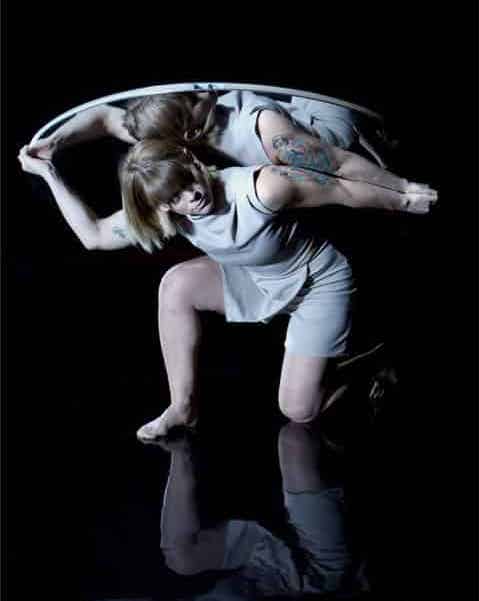Review from: Jacksons Lane, London; 17th March 2022
The myth of Atlas, which originated in Greek mythology, has permeated western culture for generations. The story of the titan who literally held the weight of the entire world on his shoulders continues to serve as a metaphor for the lives we lead today and the weight we feel we carry upon our shoulders. It offers lessons on capitalism, mental health, responsibility and much more, and thus has become truly timeless and placeless. It is universal enough to be relatable to all.
Atlas, by Oddly Moving, seeks to explore this mystical and powerful universality: the connection of myth and reality, of the shared and the personal, of metaphorically and literally. It wisely uses many methods to achieve this – from storytelling to acrobatics, from music to playing with toys; it uses every tool in its arsenal to evoke our own childhood memories and to make us consider our own relationship to this story, and to the feeling of carrying the world upon our shoulders.
The show is appealing in its simplicity. The set is minimalistic, with a few props to help bring the story to life: animal toys, burlap sacks, a few golden apples, a mirrored disk… This simplicity allows for the storytelling to become the focus of the piece, and the marriage between Charlotte’s Mooney’s direction and Grania Pickard’s storytelling is magical. Pickard’s presence is comforting and she carries the audience confidently through the show, offering a guiding hand that makes one feel truly cared for and supported. No one is holding the world on their shoulders alone, it feels, if Pickard is there to narrate it. The mirrored disk serves as a particularly mesmerising prop, creating beautiful tableaux and curious compositions between the artists and their mirror selves, reflected as if they were supporting their own weight, holding their own bodies up in the air and reminding us of the weight we all labour under daily simply by having to carry ourselves through the world – our traumas, our history, our hangups, our mental and physical health issues.
The show shines best during its moments of acrobatic storytelling. The three women on stage (Pickard, Arielle Lauzon, and Helena Berry) share the space beautifully, complementing each other while never fully stealing the limelight. They play different characters, yes, but they work collaboratively so seamlessly that it often feels as if they might be three aspects of the same being (which reminded me of a different Greek mythology character; that of the three fates). Their movement is fluid, effortless, full of strength and grace at the same time. They evoke not only the heroicness of Greek gods and titans, but also the vulnerability and nuance of the embodied femme.
The circus skills offered in this show (mainly the acrobatic sequences and the juggling of the golden apples) do an excellent job in connecting narrative to embodied practices, in bringing abstract ideas to physical, concrete images. The tricks never feel like they were performed for the sake of physical virtuosity alone, rather it was physical virtuosity offered as a means to get to the broader goal – that is, to make a story come to life. It is those moments that made me, as an audience, relate most to the performers onstage; those moments on the cusp between grandiose epicness and intimately personal were when I felt connected to the titan himself and to the more intimate stories the performers were sharing, and felt reflected in them both.
I admit, I wanted more of that connection. At times it felt like many topics were touched upon, but none were explored deeply. Perhaps it is the eternal question of having to choose between sinking one’s teeth fully into one topic, or focusing on the diversity of multiple strands to pull together something that’s bigger than the sum of its parts. I thought the moments when the show touched on mental health and personal family stories were the most powerful, where the epic mythological tale felt most relevant and alive, and I wanted a bit less epic stories and a bit more of the small, vulnerable stories. But that is more of a personal preference and in no way a detriment to this thought-provoking, nuanced, understated show.
Atlas is narrative circus as narrative circus ought to be: economic yet poetic, purposeful yet uplifting, and a stunning jewel in the crown of Oddly Moving.



